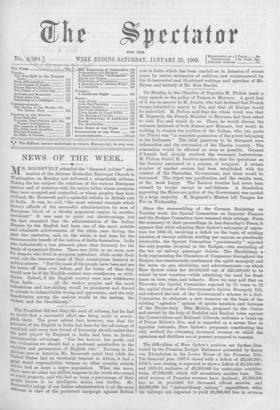Since the reassembling of the German Reichstag on Tuesday week,
the Special Committee on Imperial Finance and the Budget Committee have resumed their sittings. From the summary of their proceedings in last Saturday's Times, it appears that while adopting Herr Sydow's estimates of expen- ture for 1909-13, involving a deficit on the basis of existing taxation of twenty millions sterling per annum, as practically irreducible, the Special Committee " provisionally " rejected the only popular. proposal in the Budget,—the rescinding of the tax on railway passenger tickets. The Handelstag, a body representing the Chambers of Commerce throughout the Empire, has unanimously condemned the spirit monopoly and the taxes on gas, electricity, and advertisements—on which Herr Sydow relies for £9,000,000 out of £23,600,000 to be raised by new taxation—while admitting the need for fresh taxes on beer, wine, and tobacco. Here we may add that on Thursday the Special Committee rejected by 15 votes to 12 the capital clause of the Government's Spirits Monopoly Bill, and referred the rest of the Government's scheme to a Sub. Committee to elaborate a now measure on the basis of the existing " agrarian " system of spirits taxation, and increase of the Excise-duty. This Motion, proposed by the Centre and carried by the help of Socialist and Radical votes against the Conservatives and National Liberals, indicates a break-up of Prince Billow's bloc, and is regarded as a severe blow to agrarian interests, Herr Sydow's proposals constituting the only method for obtaining increased revenue to which the agrarians and distillers are at present prepared to consent.






































